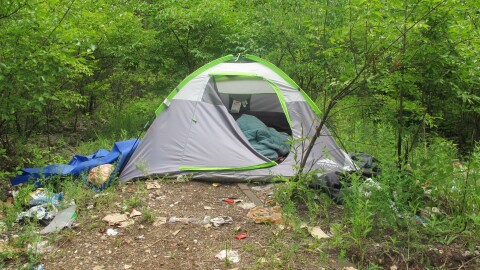The U.S. Department of Veterans Affairs says an analysis of a count of homelessness has found there are fewer unhoused veterans both in Ohio and nationally.
"We basically saw a 7.6% decline in veteran homelessness since 2023. The number of veterans experiencing homelessness in America was down at a historic all-time low to 32,882 veterans. This is the fewest number of veterans counted since HUD actually first started reporting on veteran homelessness in 2009," said Shawn Liu, the director of communications for the VA's Homeless Programs Office.
Veteran homelessness is at a record low nationwide since measurements began in 2009. And it is down 5% in Ohio since 2023.
An annual count in January of homeless people in Ohio found 589 unhoused veterans. That was down from 623 a year before.
Nationally, 32,000 veterans were homeless this year, down from 35,000 in the previous year.
Liu said the information has not been adjusted for deaths, that it's an analysis of the U.S. Department of Housing and Urban Development's annual count of homeless people conducted nationally each January.
"So, HUD actually puts out the annual homeless assessment report every year. This is not a research study, so it's not using statistical analyses or anything like that. What it actually does is it takes a couple of different bits of information service activity for veterans and pretty much anybody experiencing homelessness as they're engaging with different homeless programs and service," Liu said.
To do the counts, "hundreds or thousands" of volunteers go out into the world and count people experiencing homelessness, including veterans.
"They also take a look at data from programs, such as emergency shelters and transitional housing, to count the number of people participating in those programs at the night of the count," Liu said.
The types of resources that Liu said is helping reduce homelessness in the veteran population include prevention resources to keep veterans in their own homes and keep them from ever becoming homeless in the first place, Liu said.
To find people who need help, Liu said officials send outreach groups into encampments to meet homeless veterans, "literally where they're at and bring them in not only to VA homeless programs, but the full range of benefits and services that VA offers."
"We also have residential services that provide veterans with safe, warm, temporary places to stay right now, so that we can help them get on that path to permanent housing. And permanent housing is usually programs that provide rental subsidies that help veterans get connected to just rentals in our community, but with subsidies that make rent affordable based off of their income," Liu said.
Liu said different veterans experience homelessness in "subtly different ways."
"So it's important for us to have a wide array of options that address their individual needs," Liu said.
Liu said there are individual reasons and systematic reasons contributing to why veterans become homeless.
Individual factors include things like mental health disorders, substance-use disorders, a lack of steady income or employment and adverse childhood events, Liu said.
"But that's only part of this story, because those veterans live in society, they live in communities, and different communities may provide a greater safety net or not as great a safety net," Liu said.
Access to affordable housing and good jobs are part of the systematic problems, Liu said.
Veterans who are facing a housing crisis or are homeless can contact the National Call Center for Homeless Veterans at 877-424-3838.





